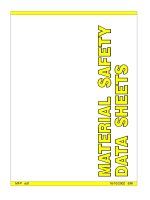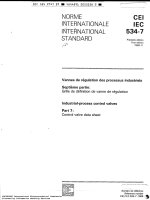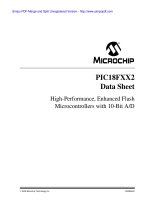Material Safety Data Sheet: White paint MP-35
Bạn đang xem bản rút gọn của tài liệu. Xem và tải ngay bản đầy đủ của tài liệu tại đây (334.94 KB, 9 trang )
Material Safety Data Sheet
PAGE
PRODUCT NAME
WHITE PAINT MP-35
( 1 /9)
SECTION 1. CHEMICAL PRODUCT AND COMPANY IDENTIFICATION
Identity (Trade Name As Used On Label); WHITE PAINT MP-35
Recommended use of the chemical and restrictions on use; White Paint for Detecting Magnetic Particle
Manufacturer Name /Address:
NAMBANG CNA CO., LTD. /392-3
Chupal-ri, Paengsung-Eup, Pyongtaek-si, Kyonggi-do,
KOREA 451-805
TEL: 8231 651 5911-8
FAX: 8231 691 6441 /8231
Date Prepared; May. 06. 2009
SECTION 2. HAZARD IDENTIFICATION
Hazard Class
Hazard Class
Hazard category
Flammable aerosols
1
Flammable liquids
2
Skin corrosion/irritation
2
Eye damage/irritation
2
Toxic to reproduction
1A
Specific target organ toxicity (Single exposure)
1
Specific target organ toxicity (Single exposure)
3(Respiratory tract irritation)
Specific target organ toxicity (Repeated exposure)
1
Aspiration hazard
2
Hazardous to the aquatic environment hazard
Chronic
3
GHS label elements, including precautionary statements
Category
Indication
Symbol
~~¢
Signal word
Danger
Hazard statement
-
Extremely flam m able aerosol.
Highly flammable liquid and vapour.
Causes skin irritation.
Causes serious eye irritation.
May damage fertility or the unborn child.
6586441
PRODUCT NAME
WHITE PAINT MP-35
PAGE
(2I9)
-
Prevention
Precautionary
statements
Response
Storage
Disposal
May cause respiratory irritation.
Causes damage to organs through prolonged or repeated exposure.
May be harmful if swallowed and enters airways.
Harmful to aquatic life with long lasting effects.
Keep away from heat/sparks/open
flames/hot surfaces. -No
smoking.
- Do not spray on an open flame or other ignition source.
- Pressurized container: Do not pierce or burn, even after use.
- Wash ... thoroughly after handling.
- Keep container tightly closed.
- Ground/Bond container and receiving equipment.
- Use explosion-proof electrical/ventilating/lighting/ .. ./equipment.
- Use only non-sparking tools.
- Take precautionary measures against static discharge.
- Wear protective gloves/eye protection/face protection.
- Obtain special instructions before use.
- Do not handle until all safety precautions have been read and
understood.
- Use personal protective equipment as required.
- Avoid breathing dust/fume/gas/mist/vapours/spray.
- Use only outdoors or in a well-ventilated area.
- Do not breathe dust/fume/gas/mist/vapours/spray.
- Do not eat, drink or smoke when using this product.
- IF ON SKIN (or hair): Remove/Take off immediately all contaminated
clothing. Rinse skin with water/shower.
- In case of fire: Use ... for extinction.
- IF ON SKIN: Wash with plenty of soap and water.
- Specific treatment (see ... on this label).
- If skin irritation occurs: Get medical advice/attention.
- Take off contaminated clothing and wash before reuse.
- IF IN EYES: Rinse cautiously with water for several minutes. Remove
contact lenses, if present and easy to do. Continue rinsing.
- If eye irritation persists: Get medical advice/attention.
- IF exposed or concerned: Get medical advice/attention.
- IF INHALED: Remove victim to fresh air and keep at rest in a position
com fortable for breathing.
- Call a POISON CENTER or doctor/physician if you feel unwell.
- Get medical advice/attention if you feel unwell.
- IF SWALLOWED: Immediately call a POISON CENTER or doctor/
physician.
- Do NOT induce vomiting.
- IF exposed: Call a POISON CENTER or doctor/physician.
- Protect from sunlight. Do not expose to tem peratures exceeding
50 "C/122
2F.
- Store locked up.
- Store in a well-ventilated place. Keep container tightly closed.
Dispose of contents/container
to ... ···in accordance
with
local/regional /national/ international regulations (to be specified).
Other hazards which do not result in classification
NFPA Rating
I
Health
Flammability
Reactivity
PRODUCT NAME
PAGE
WHITE PAINT MP-35
( 3/9 )
Ingreolerm;
Alkyd resin
1
1
0
Titanium oxide
1
0
0
Xylene
2
3
0
Toluene
2
3
0
Stabilizer
-
-
0
Dimethyl ether
2
4
1
SECTION 3. COMPOSITION/INFORMATION ON INGREDIENTS
INGREDIENTS
CAS NUMBER
%
Hazardous
-
5-15
-
13463-67-7
25-35
-
Xylene
1330-20-7
5-15
Toluene
108-88-3
10-20
-
Stabilizer
S1
<10
-
<40
-
~
'l "
Alkyd resin
Titanium oxide
Dimethyl ether
115-10-6
SECTION 4. FIRST AID PROCEDURES
Eye contact; Check for and remove any contact lenses. Immediately flush eyes with plenty of water for at
least 15 minutes, occasionally lifting the upper and lower eyelids. Get medical attention immediately.
Skin contact; In case of contact, immediately flush skin with plenty of water for at least 15 minutes while
removing contaminated clothing and shoes. Wash clothing before reuse. Clean shoes thoroughly before
reuse. Get medical attention immediately.
Inhalation; Move exposed person to fresh air. If not breathing, if breathing is irregular or if respiratory arrest
occurs, provide artificial respiration or oxygen by trained personnel. Loosen tight clothing such as a collar,
tie, belt or waistband. Get medical attention immediately.
Ingestion; Call medical doctor or poison control center immediately. Wash out mouth with water. Do not
induce vomiting unless directed to do so by medical personnel. Never give anything by mouth to an
unconscious person. Get medical attention immediately.
SECTION 5. FIRE-FIGHTING MEASURES
----------------------------,---------~
PRODUCT NAME
PAGE
WHITE PAINT MP-35
( 4/9 )
Suitable extinguishing media; Use water spray to keep fire exposed containers cool. If substance does
ignite, use C02, dry chemical or foam.
Specific hazards arising from the chemical; No information found
Special protective equipment and precautions for fire fighters;
clothing and NIOSH-approved self-contained
In the event of a fire, wear full protective
breathing apparatus with full facepiece operated in the
pressure demand or other positive pressure mode. Combustion by-products
hydrogen chloride gases.
Structural firefighters'
clothing
include phosgene and
provides only limited protection
to the
combustion products of this material.
SECTION 6. ACCIDENTAL RELEASE MEASURES
Personal precautions; No action shall be taken involving any personal risk or without suitable training.
Evacuate surrounding areas. Keep unnecessary and unprotected personnel from entering. Do not touch
or walk through spilled material. Shut off all ignition sources. No flares, smoking or flames in hazard area.
Do not breathe vapor or mist. Provide adequate ventilation. Wear appropriate respirator when ventilation
is inadequate. Put on appropriate personal protective equipment (see section 8).
Environmental precautions; Avoid dispersal of spilled material and runoff and contact with soil, waterways,
drains and sewers. Inform the relevant authorities if the product has caused environmental pollution
(sewers, waterways, soil or air).
,
Methods for containment;
ELIMINATE all ignition sources (no smoking, flares, sparks or flames in
immediate area). Dike the spilled material, where this is possible. Prevent entry into waterways, sewer,
basements or confined areas. Use water spray to reduce vapors or divert vapor cloud drift.
Methods for cleaning up;
"""
- Large Spills: Dike far ahead of spill for later disposal. Use a non-combustible
material like vermiculite,
sand or earth to soak up the product and place into a container for later disposal. Use only non-sparking
tools.
- Small Spills: Wipe up with absorbent material(e.g. cloth, fleece).
SECTION 7. HANDLING AND STORAGE
Handling; Do not get in eyes or on skin or clothing. Do not breathe vapor or mist. Do not ingest. Use only
with adequate ventilation. Wear appropriate respirator when ventilation is inadequate. Do not enter
storage areas and confined spaces unless adequately ventilated. Keep in the original container or an
approved alternative made from a compatible material, kept tightly closed when not in use. Store and use
away from heat, sparks, open flame or any other ignition source. Use explosion-proof
electrical
PRODUCT NAME
PAGE
WHITE PAINT MP-35
(5/ 9)
(ventilating, lighting and material handling) equipment. Use non-sparking
1
tools. Take precautionary
measures against electrostatic discharges. To avoid fire or explosion, dissipate static electricity during
transfer by grounding and bonding containers and equipment before transferring material. Empty
containers retain product residue and can be hazardous. Do not reuse container.
Storage; Store in accordance with local regulations. Store in a segregated and approved area. Store in
original container, protected from direct sunlight. Eliminate all ignition sources. Separate from oxidizing
materials. Keep container tightly closed and sealed until ready for use. Containers that have been opened
must be carefully resealed and kept upright to prevent leakage.!.
SECTION 8. EXPOSURE CONTROLS / PERSONAL PROTECTION
Airborne Exposure Limits;
Toluene
TWA: 50 ppm, 188 mgtm'
STEL: 150 ppm, 560 mg/m'
Xylene:
TWA: 100 ppm, 435 mg/m'
STEL: 150 ppm, 655 ms/rn'
Dimethyl ether:
1900 mg/m'(1000 mllm') DFG MAK
1000 ppm AIHA(TWA)
Engineering controls;
Use only with adequate ventilation.
Use process enclosures,
local exhaust
ventilation or other engineering controls to keep worker exposure to airborne contaminants below any
"
recommended
or statutory limits. The engineering controls also need to keep gas, vapor or dust
concentrations below any lower explosive limits. Use explosion-proof ventilation equipment.
Personal protective equipment;
- Eye / face protection; Safety eyewear complying with an approved standard should be used when a risk
assessment
indicates
this is necessary to avoid exposure to liquid splashes,
mists or dusts.
Recommended: splash goggles.
- Skin protection; Personal protective equipment for the body should be selected based on the task being
performed and the risks involved and should be approved by a specialist before handling this product.
Recommended: lab coat.
- Respiratory protection; Use a properly fitted, air-purifying
or air-fed respirator com plying with an
approved standard if a risk assessment indicates this is necessary. Respirator selection must be based
PRODUCT NAME
WHITE PAINT MP-35
PAGE
( 6/9 )
!
I
on known or anticipated exposure levels. the hazards of the product and the safe working limits of the
selected respirator.
SECTION 9. PHYSICAL I CHEMICAL CHARACTERISTICS
Appearance; White film after drying
Odor; Aromatic solvent odor
Odour threshold; No information found
Ph; No information found
Melting point/freezing point; No information found
Initial boiling point and boiling range; No information found
Flash point; -41 'C(Dimethyl ether)
Evaporation rate; No information found
Flammability (solid. gas); No information found
Upper/lower flammability or explosive limits; 27.0/3.4%
(Dimethyl ether)
Vapour pressure; No information found
Vapour density; No information found
Specific Gravity (H20 = 1); 0.98
±
0.05
Relative density; No information found
Solubility(ies); Insoluble
Partition coefficient; n-octanol/water: No information found
Auto-ignition temperature; No information found
Decomposition temperature; No information found
,,_
Viscosity; No information found
Molecular Weight; No information found
SECTION 10. STABILITY AND REACTIVITY
STABILITY; Stable under ordinary conditions of use and storage
Hazardous Polymerization: Will not occur.
Conditions to Avoid; Heat. flames and sparks. Incompatible materials.
Incompatability (Materials to Avoid); Strong oxidizing agents.
Hazardous Decomposition Products; carbon oxide
SECTION 11. TOXICOLOGICAL INFORMATION
PRODUCT NAME
PAGE
WHITE PAINT MP-35
(7/9 )
- Alkyd resin Acute toxicity
- Oral: No information found
- Dermal: No information found
- Inhalation: No information found
Skin corrosion/irritation: No inform ation found
Serious eye damage/irritation: No information found
Respiratory or skin sensitization: No information found
Germ cell mutagenicity: No information found
Carcinogenicity: No information found
Reproductive toxicity: No information found
Specific target organ toxicity (single exposure): No information found
Specific target organ toxicity (repeated exposure): No information found
Aspiration hazard: No information found
- TolueneAcute toxicity
- Oral: LD50 2600 mg/kg (rat)
- Dermal: LD50 120000 mg/kg (rat)
- Inhalation: LC50 12.5 mg/ t 4 hr (rat)
Skin corrosion/irritation: 2
Serious eye damage/irritation: 2A
Respiratory or skin sensitization: No information found
Germ cell mutagenicity: No information found
Carcinogenicity: No information found
Reproductive toxicity: 1A
Specific target organ toxicity (single exposure): 3 (Respiratory tract irritation, Narcotic effects)
Specific target organ toxicity (repeated exposure): 1
Aspiration hazard: 1
- XyleneAcute toxicity
- Oral: LD50 3500 mg/kg (rat)
- Dermal: LD50 ~ 4350 mg/kg (rabbit)
- Inhalation: LC50 6700 ppm 4 hr (rat)
Skin corrosion/irritation: Using a rabbit skin irritation test results and causes irritation of the middle.
PRODUCT NAME
PAGE
WHITE PAINT MP-35
(8 /9 )
Serious eye damage/irritation; Using a rabbit eye irritation test results and causes irritation of the middle.
Respiratory or skin sensitization; No information found
Germ cell mutagenicity; No information found
Carcinogenicity; No information found
Reproductive toxicity; 1B
Specific target organ toxicity (single exposure); 3 (Narcotic effects)
Specific target organ toxicity (repeated exposure); 1
Aspiration hazard; 2
- Dimethyl ether Acute toxicity
- Oral; No information found
- Dermal; No information found
- Inhalation; LC50 308 g/ m' (rat)
Skin corrosion/irritation; No information found
Serious eye damage/irritation; No information found
Respiratory or skin sensitization; No information found
Germ cell mutagenicity; No information found
Carcinogenicity; No information found
Reproductive toxicity; No information found
Specific target organ toxicity (single exposure); No information found
Specific target organ toxicity (repeated exposure); No information found
Aspiration hazard; No information found
•
SECTION 12. ECOLOGICAL INFORMATION
Toxicity;
- TolueneFish: LC50 8.11 mg/£ 96 hr
Crustaceans: EC50 3.5 mg/£ 96 hr (Brown shrimp)
Bird: EC50 9.4 mg/ t 8 hr
- XyleneFish: LC50 3.3 mg/£ 96 hr
Crustaceans : LC50 190 mg/ £ 96 hr
Bird: No information found
Persistence and degradability; No information found
PRODUCT NAME
PAGE
WHITE PAINT MP-35
(9/ 9)
Bioaccumulative potential; No information found
Mobility in soil; No information found
Other adverse effects; No information found
SECTION 13. DISPOSAL CONSIDERATION
Whatever cannot be saved for recovery or recycling should be managed in an appropriate and approved
waste disposal facility.
Processing, use or contamination
of this product may change the waste
management options. State and local disposal regulations may differ from federal disposal regulations.
Dispose of container and unused contents in accordance with federal, state and local requirements.
SECTION 14. TRANSPORT INFORMATION
Proper Shipping Name; Aerosol
Class No 2.1
UN-NUMBER; UN 1950
SECTION 15. REGULATORY INFORMATION
Follow all regulation in your country
SECTION 16. OTHER INFORMATION
"
This information has been faithfully prepared on the basis of various knowledge and information and is not
to guarantee the quality of this product. Also, this inform ation can be changed without prior notice in
accordance with introduction of new knowledge and test results, etc. For inquiries, please contact us or
the place of product purchase.









